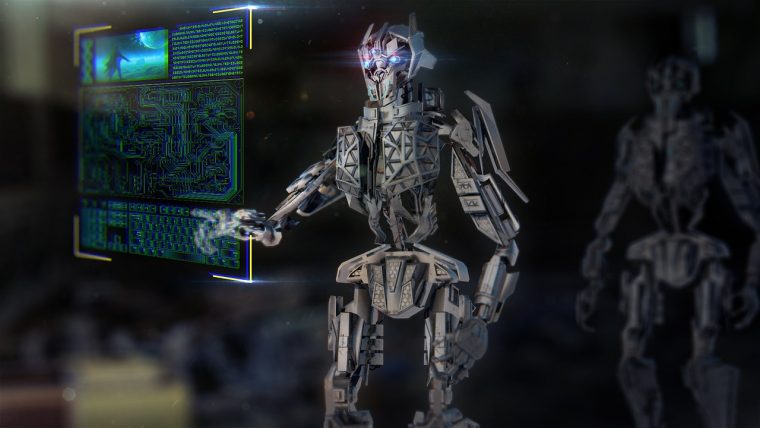
The AI investment boom has revolutionized the modern world in ways reminiscent of the dotcom era (and dotcom crash) of the late 1990s.
It has led to a surge in investment, unprecedented technological innovation, and soaring stock prices.
However, as we delve deeper into the era of artificial intelligence, the spectre of the dotcom bubble burst lurks in the shadows, reminding us of the potential perils of overly optimistic investment.
AI, much like the internet in the late ’90s, has transformed almost every sector.
The booming AI economy has yielded a cascade of investment, reflected in Nvidia’s stocks soaring over 100% in the past six months, Microsoft gaining almost $500 billion in market value since its incorporation of AI, and Alphabet’s recent surge of $60 billion in a single day.
AI fantasy/hype in one chart: Shows how high expectations are for #Nvidia. The stock is valued at ~29 times sales. Measured against that, no stock in Nasdaq 100 is that expensive. Next Wed, chip manufacturer will present figures & outlook. Then we will see whether expectations… pic.twitter.com/cSOfQN22oM
— Holger Zschaepitz (@Schuldensuehner) May 21, 2023
Unbridled Optimism Creates Big Bubbles
Yet, history has shown that unbridled optimism can lead to bubbles, which inevitably burst.
In the case of the dotcom bubble, what started as genuine excitement about the transformative power of the internet turned into a speculative frenzy, with investors pouring money into any company with a “.com” suffix, irrespective of its profitability.
This led to a surge in stock prices and the emergence of a thriving AI crypto market, creating an economic bubble that eventually burst in March 2000, wiping off trillions of dollars from the market.
The memory of the dotcom crash leads us to ponder whether the current AI boom could follow a similar trajectory.
Investors are pouring vast sums into AI, but the question is: are these valuations based on rational assessments of future profitability, or is it speculative frenzy?
If the latter, we may well be heading towards an AI investment bust.
Causes of https://t.co/e8PYAqnU8Q crash in 1999/2000
1. Overvaluation of dotcom companies
2. Abundance of venture capital
3. Media FrenzyAre we Dejavu? pic.twitter.com/vhapKfwsNz
— The Prophet (Gammaprophet CEO) (@TheGodMarket) May 21, 2023
Commercial Viability at Heart of AI Investment
One of the hallmarks of the dotcom era was a disconnect between investor excitement and the actual commercial viability of many internet companies.
The same could be happening with AI. While there’s no doubt that AI has achieved impressive results in areas such as molecular biology and strategic games, its ability to consistently deliver profitable results in commercial, financial, and political realms, where the rules are less defined, remains unproven.
Behavioural economics warns of the inherent flaws in human decision-making that could contribute to a potential AI investment bust.
The dotcom bubble was fueled by systematic biases like overconfidence, herd mentality, and the fear of missing out, which could be repeated in the AI era.
In in the instance of AI, the problem of sampling bias, where predictive models based on statistical learning might omit rare but consequential events, is another concern.
This factor is critical for investors as stock market returns can be affected by rare but extreme movements in share prices.
Furthermore, Goodhart’s Law, which states that when a measure becomes a target, it ceases to be a good measure, can present significant challenges for AI.
In a world where humans constantly adapt and outsmart predictive models, AI’s ability to consistently deliver remains in question.
While it would be premature to predict an AI investment bust, history does provide some valuable lessons.
The dotcom era serves as a poignant reminder of the dangers of speculative investment and over-reliance on emerging technology.
While AI certainly has the potential to revolutionize many aspects of life, it’s essential for investors to approach it with a healthy degree of skepticism, realistic expectations, and a rigorous assessment of its commercial viability.
“My colleagues, they study artificial intelligence,” the Israeli psychologist Amos Tversky once quipped. “Me, I study natural stupidity.” @felixmwmartin on AI bubbles and markets https://t.co/F3HRJNfiHw
— Rory Stewart (@RoryStewartUK) May 19, 2023
As we journey deeper into the AI era, the words of Amos Tversky, the co-founder of behavioural economics, ring true: “Artificial intelligence may have more in common with natural stupidity than humans – or machines – currently think.”
RELATED:
- Apple Looks to be the Next Tech Giant to Go After Generative-AI With New Hires
- China is Deleting Hundreds of Thousands of AI-Generated News Accounts and Posts
- OpenAI Launches Official ChatGPT App on iPhone – Android App Coming Soon
What's the Best Crypto to Buy Now?
- B2C Listed the Top Rated Cryptocurrencies for 2023
- Get Early Access to Presales & Private Sales
- KYC Verified & Audited, Public Teams
- Most Voted for Tokens on CoinSniper
- Upcoming Listings on Exchanges, NFT Drops